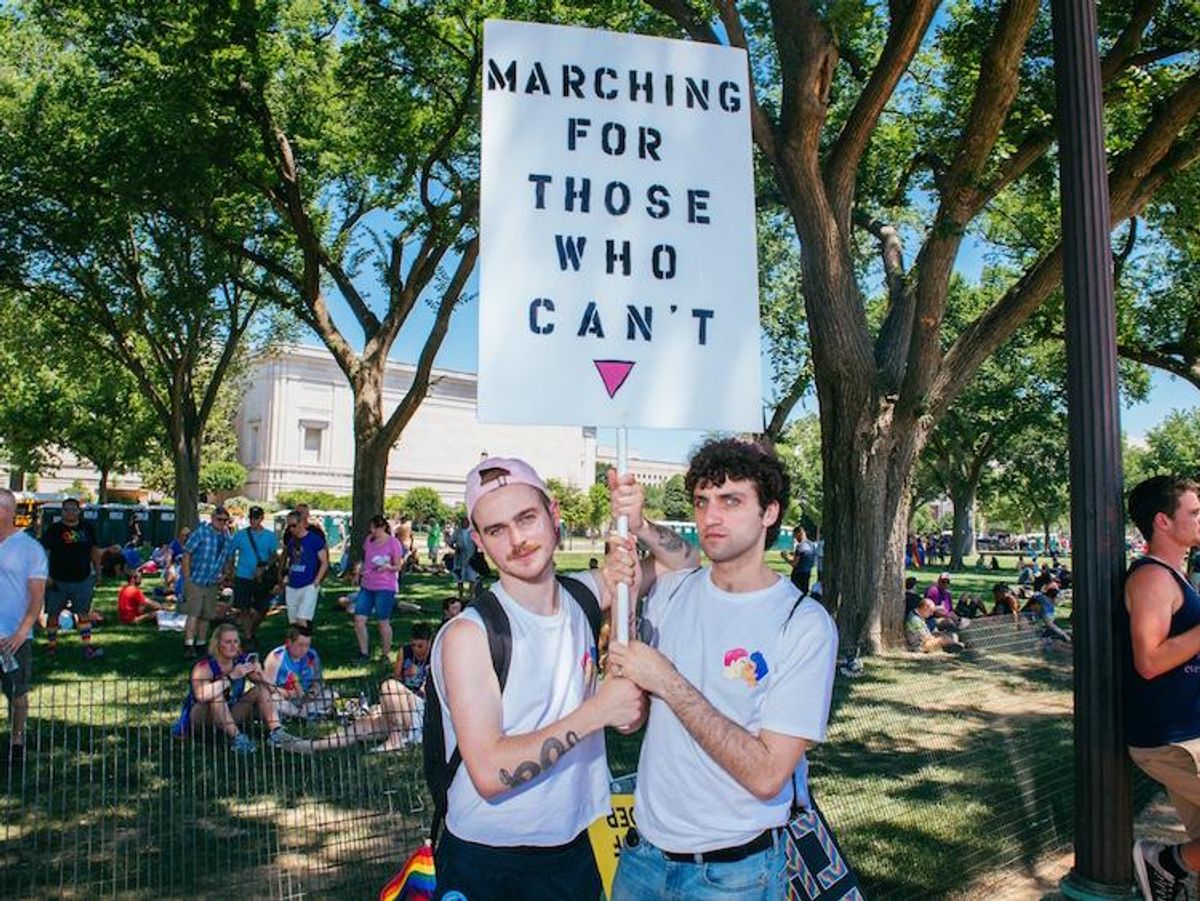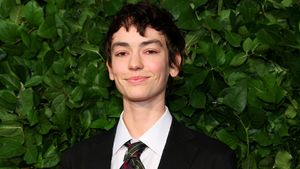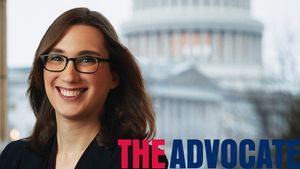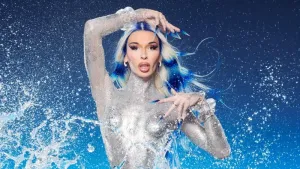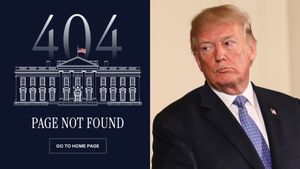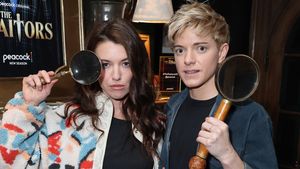This Saturday, Adam Eli and Rooney will lead a group of LGBTQI+ New Yorkers on a march from Stonewall to Trump Tower, demanding the Trump administration provide humanitarian visas for queers who've escaped from Chechnya. Their activist group, called Voices 4 Chechnya, "believes that non-violent, direct action activism is integral to the fight for human dignity and equality for all"--a mission that reflects Eli's activism through Gays Against Guns and Rooney's illustrations that champion queer ideas.
Related | Voices 4 Chechnya Sets Date for NYC March to Demand Action
On National Coming Out Day, we asked the two New Yorkers and longtime friends to reflect on coming out in their respective religious families--Eli in Judaism and Rooney in Mormonism. Read their conversation, below, and visit voices4chechnya.com for more information on how to fight Russia's violently homophobic activity.
Adam Eli: I think there is a lot of discourse around the idea that people don't have to come out anymore or that coming out actually might be a bad thing, whereas our religious backgrounds prevented us from being able to be apart of that. Being gay and everyone knowing without having to come out was not an option for me.
Rooney: Likewise. The doctrine surrounding homosexuality or anything queer within Mormonism, and I suspect in Judaism as well, is quite... if you accept it, there's a lot you have to give up believing or following. So, coming out to yourself is like an event in itself because it redefines how you interact with your family, friends and community, which is all religion-based.
Adam: Definitely. I think that the difference is while technically in the scripture, there's not a tremendous amount of room, it says pretty clearly that you can't have gay sex. However, in cultural Judaism, there is a lot of room for queer people and there are many examples of queer people being happily Jewish. When I first was telling people how hard it was for me to come out to my Orthodox community, people looked at me in shock and they were like, We didn't even realize that there were Jewish people who weren't accepting of gay people. It was really hard for me because I didn't know anyone in my Orthodox world that was gay and Jewish, but the American Jewish community has proven pretty clearly that one can be queer and welcomed in the Jewish community, and I definitely feel that way today.
Related | URL to IRL: Adam Eli on Social Media Activism
Rooney: That makes sense. I think that's a distinction, as well, between of how Judaism and Mormonism interact with queerness. In a way, there is a culture surrounding Mormonism, but you can't separate it from the doctrine. Mormonism is all or nothing. Whether you take part in Mormon culture has nothing to do with your salvation, but you must accept 100 percent of the doctrine or none of it. There's a whole dialogue in the church around people who pick and choose what teachings they will follow and what they don't, and it's highly demonized and frowned upon.
Adam: At least the way Judaism manifests today, particularly in America, it's really opposite. Within Judaism, there are different schools. There's the Orthodox where you have to accept everything and the ultra Orthodox where you have to accept everything, and I'm not really welcomed there. And there's the conservative and reform movement, who have honestly been at the forefront of gay rights, allowing people to be gay and encouraging people to come out in their congregations, since like the early '70s. So, there is an all or nothing sect, but I would say that they are certainly not the dominant one. Although, unfortunately, they are the ones I grew up with.
Rooney: Orthodox, you mean?
Adam: Yeah, Orthodox. But it was very easy for me to find space, not there.
Rooney: That's something I have really admired when learning about your experience, is that a lot of people who grew up Orthodox still call themselves Jewish. It's part of your identity forever.
Adam: Yes.
Rooney: Because you can still participate culturally in Judaism.
Adam: Exactly. There is room in Judaism, at least in Judaism today, to exist how you want and bend rules and break rules. Judaism is not all or nothing. To some people it is and I don't fit in there and that's fine with me. But for the most part, it's not all or nothing.
Rooney: When I talk to people about me growing up Mormon, people either refer to me as Mormon or ask if I'm still [Mormon]. Initially, I was really bothered and kind of annoyed by that, but it makes sense to me now because there are a lot of other people, like yourself, who still say they are Jewish, whereas I want: a) nothing to do with Mormonism and b) don't identify with it... because I can't.
Adam: Since you can't identify with Mormonism because it's that all or nothing narrative, how does that make you feel?
Rooney: It redefined the way I lived my life completely. If I was going to accept that I was gay and also accept that there was nothing wrong with that and that I wanted to pursue authenticity, that called into question everything I had ever been taught about the church. Which not only defines your mortal life, but there's a lot of doctrine in Mormonism about what we did before this life and an enormous amount of doctrine about what we do after this life. Mormonism is all about what you will get after this life. As far as your present life, everything single thing of your life is centered around that doctrine. For me, coming to a place where I had to, not throw that out, but not believe it anymore really turned my world completely upside down. I was disoriented for a very long time.
Adam: In Judaism, there's lots of stuff in the Bible that we just certainly don't follow. Like certain aspects of the way you treat women. There are work-like specifications on how to treat slaves. There are certain dietary things that aren't applicable anymore.
Rooney: Right
Adam: Judaism is queen of adaptation. One of the reasons Judaism has survived so many crises and so much persecution is its ability to be flexible and adapt. So when I was coming out, no one had ever come out before in that Orthodox world, to my knowledge. I didn't know people were going to react. We did not know and we were scared. This was like 2009. We're talking pre-gay marriage, but post-Ellen/Obama years, Glee and the "It Gets Better" campaign. Lady Gaga had just released "Bad Romance." So I rode the cultural tide in, and the Orthodox community that I came from really came through. I was sort of the first one, and they all supported me and my family.
Rooney: That's really interesting that your coming out was timed with this queer zeitgeist.
Adam: It really was. How did your community react when you came out?
Related | Imagine Dragons' Dan Reynolds on Bringing Together Mormons & LGBTQ Youth
Rooney: My immediate family accepted me, which is another thing we share in common. There was definitely a period of this enormous dynamic change that we were all adjusting to for a while, but my siblings are my best friends and always have been. We've always been so close, as well as my parents. They had to choose between Am I gonna close this person off? or Am I gonna hold onto this amazing relationship I've spent my life building and adapt? The choice is pretty clear from the beginning. I'm really lucky as far as most Mormons-coming-out goes. I was not thrown out. I was not demonized. I was welcome at family functions.
Adam: Is that standard?
Rooney: It's such a grab bag. There are plenty of people who have come out to their Mormon families and had the experience I've had. There are people who have been completely shut out and, to this day, have not spoken to their families for years.
Adam: That makes me so sad. As if God or whatever higher power you believe in could ever possibly want you to not create a family and feel love and talk to your parents.
Rooney: There is kind of a disconnect I feel some ways because, Have I been cut out from Mormonism completely? Yes. There is nothing in the Mormon Church that wants me back or that wants me to be apart of it as I am now. I am completely cut off. So in that way, that still hurts a lot.
Adam: That hurts me to hear.
Rooney: It is a little hard for me, sometimes, that I have family members who accept me and who subscribe to Mormonism, but Mormonism itself wants nothing to do with me. I don't really talk about that with my really devout family members because it hurts me that they are still an active part of a religion that actively discriminates my people.
Adam: I think that sometimes when it comes to faith and coming out, there's sort of like a system. A crisis of faith can occur because let's say you're a parent who believes in God and you believe in whatever doctrine you grew up in, but you also love your child and your child is gay and there's nothing you can do about it. It's like, how can you reconcile your faith, with something that directly disproves its veracity. It's literally system malfunction, as in, it doesn't work. You know, people can lose it. I think Judaism just offered me so many different types of cultural options. And I also am very proud to be a New York City gay Jew. In the way I sort found my "gay, Jewish, New Yorker, lox and bagels" narrative, is there a gay Mormon culture?
Rooney: There's two worlds of it. There are Mormons who identify as gay or on the queer spectrum somewhere who deny any expression of it besides this is who I am. They're still devout Mormons that cannot date because despite who they are as a mortal, they want to inherit exaltation after this life. I think of those people and my heart aches for them, but, also, I hope they're happy. Then there's gay ex-Mormons, or queer ex-Mormons, that come from that, but aren't apart of it.
Adam: Do you feel camaraderie with those ex-Mormons that are gay?
Rooney: Absolutely, and I regularly hang out with this group of New York City ex-Mormon queer people. Even if we don't talk about our past at all, it's nice to just be around people who have come from that experience exactly and understand why you're fucked up the way that you're fucked up.
Adam: My religion [and] culture has allowed me to find some middle ground. Would you be interested in trying to create or facilitate a middle ground for yourself and for the future?
Rooney: I don't wish ill on any devout Mormon necessarily, but I want nothing to do with being part of Mormonism as a religion at all--which I think is a healthy choice for me. It is part of my life's work, and I have not figured out how to go about this, yet, to somehow reach out the queer Mormon youth. And there are people who do so and empower them to live authentically, whether that means they stay or leave.
Adam: I was super angry for, like, six years and was totally non-Jewish identifying and then one day, I found my way back to it.
Rooney: How many years have you been out?
Adam: I came out in 2009, and I didn't start feeling Jewish again for, at least, 5 maybe 6 years.
Rooney: And I'm coming up on 5 in November. I guess time will tell, but I think there is some anger that I imagine will dissipate and I'll be able to interact with Mormonism--or at least reach out to people who are still in it--in affective and loving ways.
Adam: Both of us are very publicly gay and openly talk about being gay all the time in a very public-facing manner using. Since harkening back to when the 12 tribes of Israel were entering Egypt, there were gay men that left Egypt with Moses, and I don't know if they could come out. So, I like the think, or hope to think, that being publicly gay now and Jewish, I'm using my voice for voices from my own heritage that were never allowed to have any.
Rooney: I feel almost identical to that. There are a lot of people who, in Mormonism, have absolutely been thrown out or completely cut off by their families until quite recently. So I'm very grateful for that, but that you and I both get to live so publicly as to give hope and continue that narrative.
Adam: And use our voices loudly because a lot of people before us had none.
